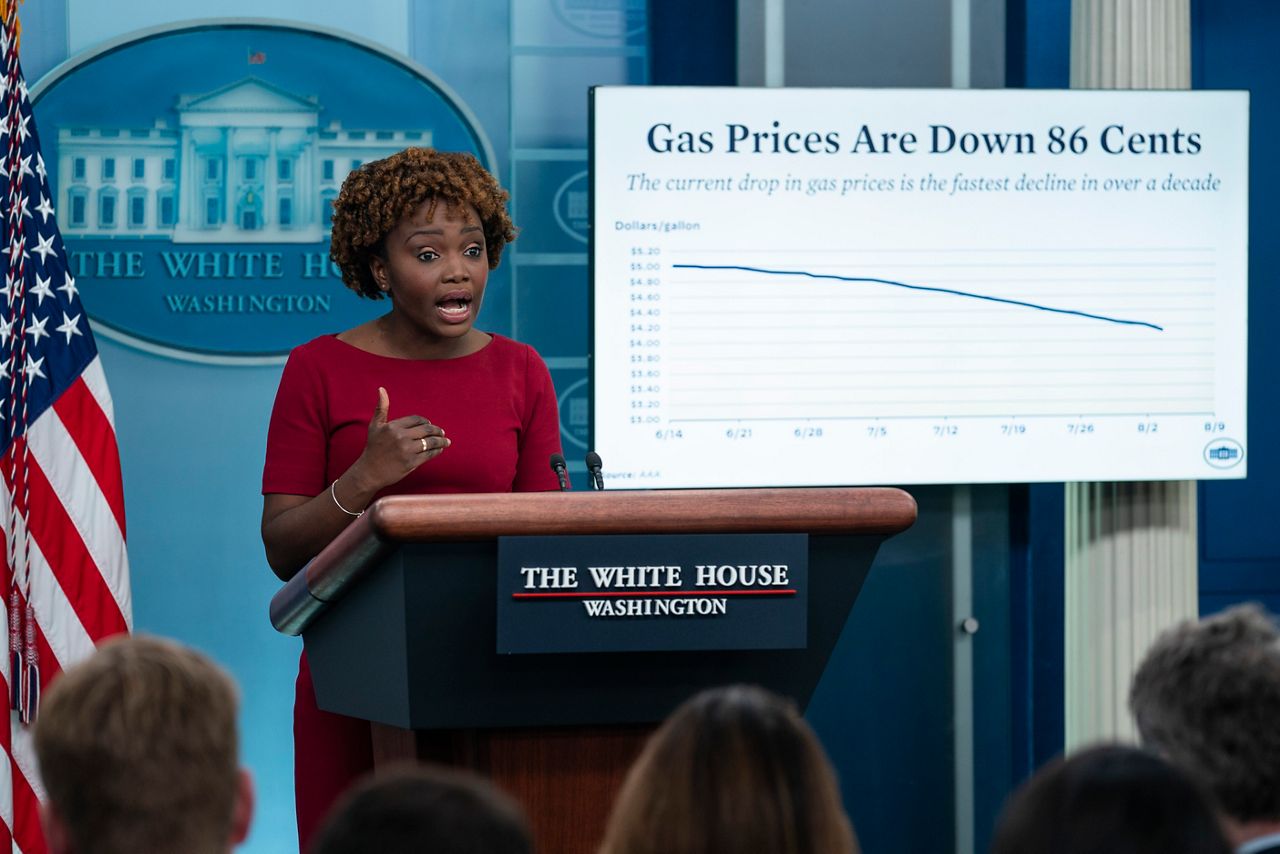Five former Treasury Secretaries on Wednesday from both Republican and Democratic administrations issued a statement strongly backing the Inflation Reduction Act, the sweeping health care, climate and tax agreement from Senate Majority Leader Chuck Schumer, D-N.Y., and West Virginia Sen. Joe Manchin.
The bill aims lower prices on some prescription drugs, extend Affordable Care Act subsidies, invest $369 billion in fighting climate change and energy production and pay down the federal deficit by $300 billion. The bill would be paid for by a 15% corporate minimum tax on companies worth $1 billion or more, increase IRS enforcement and closing the so-called carried interest loophole — with the pledge of no new taxes on families making less than $400,000 and no new taxes on small businesses.
At a briefing on Wednesday, White House press secretary Karine Jean-Pierre said that the Treasury officials “reaffirmed that this package will cut many of family's biggest costs and act against inflation.”
“They also became the latest in a long list of experts … who have debunked congressional Republicans lies meant to protect tax welfare for wealthy special interests at any cost, even prolong inflation,” she added.
“As former Treasury Secretaries of both Democratic and Republican Administrations, we support the Inflation Reduction Act which is financed by prudent tax policy that will collect more from top-earners and large corporations,” the group wrote in a joint statement.
The group of five former Treasury chiefs consists of Hank Paulson (George W. Bush), Robert Rubin and Larry Summers (Bill Clinton) and Tim Geithner and Jacob Lew (Barack Obama).
Summers in particular is an oft-cited inflation expert by members of both parties who has largely been critical of the Biden administration handling of inflation. Leader Schumer shared a video on Twitter Wednesday of Senate Minority Leader Mitch McConnell, R-Ky., quoting the former Treasury Secretary, followed by Summers' praise of the Inflation Reduction Act.
“Taxes due or paid will not increase for any family making less than $400,000/year,” they continued. “And the extra taxes levied on corporations do not reflect increases in the corporate tax rate, but rather the reclaiming of revenue lost to tax avoidance and provisions benefitting the most affluent.”
“The selective presentation by some of the distributional effects of this bill neglects benefits to middle-class families from reducing deficits, from bringing down prescription drug prices, and from more affordable energy,” they concluded. “This legislation will help increase American competitiveness, address our climate crisis, lower costs for families, and fight inflation — and should be passed immediately by Congress.”
Jean-Pierre also pointed to a trio of recent polls which show widespread support for the measure and its provisions.
A new survey released Wednesday by Data for Progress and Climate Power found that 73% of voters support the bill, including 95% of Democrats and 52% of Republicans. The poll also found that a majority of voters support the measure’s climate provisions, more than half believe it will increase the country’s energy security and 64% of those surveyed said they would be more likely to support a candidate who backed the bill.
A poll from Navigator Research found that nearly two-in-three voters (65%) support the Inflation Reduction Act, compared to 24% who oppose; the support figure grows to 66% when told the plan is paid for with tax increases on corporations and the wealthiest Americans.
A Yahoo News / YouGov poll released Tuesday showed strong support for the bill’s provisions: Sixty-one percent backed the provision to lower the cost of prescription drugs, while 53% of those surveyed were in favor of the tax on large corporations and setting aside $300 billion for deficit reduction. Overall, 47% of those surveyed favor the proposal compared to 30% opposed and 23% who were unsure.
Senate Majority Leader Chuck Schumer, D-N.Y., who negotiated the bill with Manchin, said on the Senate floor Monday that they will take action in the coming days on the bill.
Schumer said that Democrats' "timeline has not changed and I expect to bring this legislation to the Senate floor to begin voting this week."
"At the end of the day, the American people want us to do a few straightforward things," Schumer said. "They want us to lower the costs of daily expenses like health care and drugs. They want us to lower energy costs and protect our planet. From future generations. And they want to make sure that everyone plays by the same rules, and that we close loopholes long exploited by powerful corporations."
"That's what the Inflation Reduction Act will do, and soon Democrats will take action to pass this bill. And deliver on our promise to make better the lives of the American people," he added.
Assuming every Republican in the evenly divided Senate opposes the measure, Democrats will need all 50 of their members to be present and vote in order to pass the bill, with Vice President Kamala Harris serving as a tiebreaker.
Also at Wednesday's briefing, Jean-Pierre touted the administration's efforts to lower gas prices, a major driver of inflation. Gas prices have fallen for 50 straight days, she said, but noted that there is still work to be done to lower costs for American families.
"We're now seeing 50 days into what remains the fastest decline in gas prices in over a decade," SHE SAID. "Gas prices are now down at six cents a gallon from their June peak, saving American families with two cars, on average, over $90 a month on gas, and drivers can now find gas for the for them for less than $3.99 a gallon at more than half of all gas stations across the country."

"Prices are coming down even as Putin's war continues to put pressure on global energy supplies," she continued. "President Biden promised he would address Putin's price hike at the pump and he is releasing 1 million barrels of oil a day from the Strategic Petroleum Reserve. He is rallying international partners to release an unprecedented amount of oil."
"More work remainsm but prices are going down, and the president will continue to call on domestic and international oil producers to increase output so they can continue to come down," she added.
